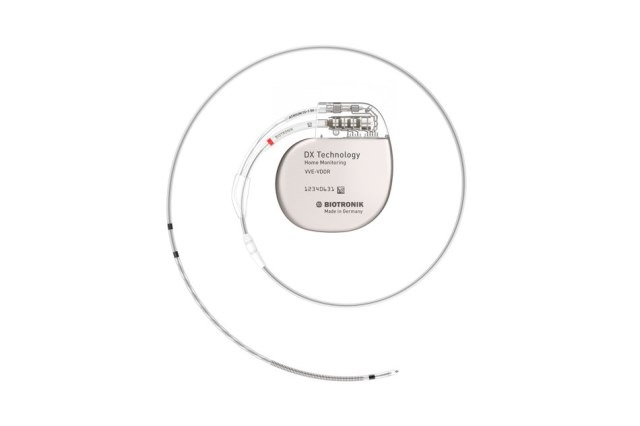
Trial data also demonstrates the DX system is superior to single-chamber ICDs.
“We’ve proven that the DX system gathers significant data with a single lead. Having the benefits of dual-chamber diagnostics without the need for an atrial lead is a true advantage for electrophysiologists,” said Dr. George Thomas, SENSE Primary Investigator, Weill Cornell Medical College, New York. “The system can be trusted to deliver appropriate therapy while providing exceptional diagnostic data that improves patient care and outcomes.”
AHREs create an increased risk of developing atrial fibrillation (AF)1 — when AF is left undetected, patients are at an increased risk of stroke. Typically, atrial sensing capabilities require the need for an additional lead, creating increased risk of complications. BIOTRONIK’s DX system, featured in both ICD and cardiac resynchronization therapy defibrillator (CRT-D) devices, detects a true atrial signal without the need for an atrial sensing lead2 — reducing costs, procedure complexity and implant time compared to dual-chamber ICDs.3,4,5
The SENSE Trial analyzed the efficacy of the DX system in detecting AHREs compared to single-chamber ICDs and dual-chamber ICDs. This prospective cohort-controlled trial enrolled 150 patients with a DX system at eight study centers in the U.S. and compared results to retrospective single and dual-chamber age, sex and left ventricular ejection fraction (LVEF) matched cohorts. The AHRE detection rates at 12-months post implant are below:
DX: 13.0 percent
Dual-Chamber: 13.0 percent
Single-Chamber: 5.3 percent
DX patients received zero inappropriate shocks, where traditional single-chamber patients had an inappropriate shock rate of 3.3 percent. Other large studies have reported inappropriate shock rates for single-chamber ICDs as high as 6 percent at one year.6 This data provides an additional proof point of DX superiority over single-chamber and demonstrates the system’s ability to reduce inappropriate therapy. DX also maintained quality atrial sensing amplitudes from implant to 12-month follow up, aiding in the ability to consistently and appropriately detect AHRE.
“The DX system features the only ICD on the market that provides dual-chamber diagnostics through a single lead based on a true atrial signal. Results of the SENSE Trial further demonstrate the superiority of the DX system,” said Ryan Walters, President at BIOTRONIK, Inc. “Early detection, fewer complications and increased peace of mind for patients and physicians — that is exactly what BIOTRONIK’s DX system provides.”
The SENSE Trial was sponsored by Weill Medical College of Cornell University in cooperation with BIOTRONIK. Further information can be found at clinicaltrials.gov (identifier NCT02186704). The DX system is currently available in BIOTRONIK’s recently launched Acticor devices.
Source: Company Press Release






